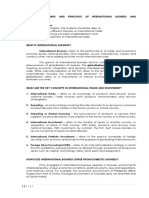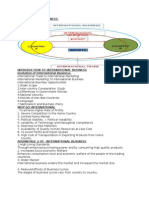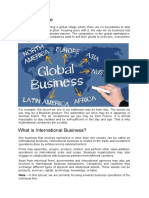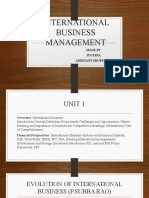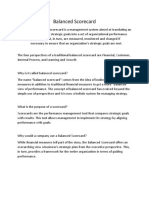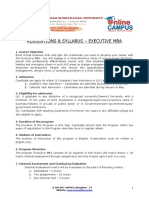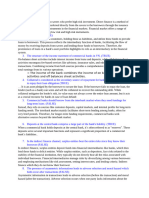Chapter 2
Chapter 2
Uploaded by
CASAQUIT, IRA LORAINECopyright:
Available Formats
Chapter 2
Chapter 2
Uploaded by
CASAQUIT, IRA LORAINEOriginal Title
Copyright
Available Formats
Share this document
Did you find this document useful?
Is this content inappropriate?
Copyright:
Available Formats
Chapter 2
Chapter 2
Uploaded by
CASAQUIT, IRA LORAINECopyright:
Available Formats
Chapter 2
Global Strategic Planning
Learning Objectives:
After studying this chapter, you should be able to do the following:
1. Discuss the nature of doing business globally, including language.
2. Explain the advantages and disadvantages of doing business globally.
3. Discuss the global challenge facing firms and why this is a strategic issue
The Nature of Doing Business Globally Exports
Globalization is a process of doing business worldwide, so strategic decisions are made based on global
profitability of the firm rather than just domestic considerations. A global strategy seeks to meet the
needs of customers worldwide, with the highest value at the lowest cost.
A global strategy includes designing, producing, and marketing products with global needs in mind,
instead of considering individual countries alone. A global strategy integrates actions against
competitors into a worldwide plan. Today, there are global buyers and sellers and the instant
transmission of money and information across continents.
Organizations that conduct business operations across national borders are called international firms or
multinational corporations. The strategic-management process is conceptually the same for
multinational firms as for purely domestic firms; however, the process is more complex for international
firms as a result of more variables and relationships.
The social, cultural, demographic, environmental, political, governmental, legal, technological, and
competitive opportunities and threats that face a multinational corporation are almost limitless, and the
number and complexity of these factors increase dramatically with the number of products produced
and the number of geographic areas served.
Different Languages Globally
Strategic issue facing many firms is whether to publish their website material in different languages,
given that most of the world’s population does not speak English. Pioneering work to document the
number of different languages spoken has been done by the Summer Institute of Linguistics (SIL)
International.
Advantages and Disadvantages of Doing Business Globally
Firms have numerous reasons for formulating and implementing strategies that initiate, continue, or
expand involvement in business operations across national borders. Perhaps the greatest advantage is
that firms can gain new customers for their products and services, thus increasing revenues. Growth in
revenues and profits is a common organizational objective and often an expectation of shareholders
because it is a measure of organizational success.
Potential advantages to initiating, continuing, or expanding international operations are as follows:
1. Firms can gain new customers for their products.
2. Foreign operations can reduce unit costs, and spread economic risks over a wider number of markets.
3. Foreign operations can allow firms to establish low-cost production facilities in locations close to raw
materials or cheap labor.
4. Competitors in foreign markets may not exist, or competition may be less intense than in domestic
markets.
5. Joint ventures can enable firms to learn the technology, culture, and business practices of other
people and to make contacts with potential customers, suppliers, creditors, and distributors in foreign
countries.
The availability, depth, and reliability of economic and marketing information in different countries vary
extensively, as do industrial structures, business practices, and the number and nature of regional
organizations.
There are also numerous potential disadvantages of initiating, continuing, or expanding business across
national borders, such as the following:
1. Foreign operations could be held by nationalistic factions.
2. Firms confront different and often little-understood social, cultural, demographic, environmental,
political, governmental, legal, technological, economic, and competitive forces when doing business
internationally. These forces can make communication difficult in the firm.
3. Weaknesses of competitors in foreign lands are often overestimated, and strengths are often
underestimated. Keeping informed about the number and nature of competitors is more difficult when
doing business internationally.
4. Language, culture, and value systems differ among countries, which can create barriers to
communication and problems managing people.
5. Dealing with two or more monetary systems can complicate international business operations.
The Global Challenge
Few companies can afford to ignore the presence of international competition. More and more countries
around the world are welcoming foreign investment and capital. As a result, labor markets have steadily
become more international. East Asian countries are market leaders in labor-intensive industries, Brazil
offers abundant natural resources and rapidly developing markets, and Germany offers skilled labor and
technology.
The drive to improve the efficiency of global business operations is leading to greater functional
specialization. Many countries are quite protectionist, and this position can impact companies’ strategic
plans. Protectionism refers to countries imposing tariffs, taxes, and regulations on firms outside the
country to favor their own companies and people. Most economists argue that protectionism harms the
world economy because it inhibits trade among countries and invites retaliation.
Communication may be the most important word in strategic management. Americans increasingly
interact with managers in other countries, so it is important to understand communication differences
across countries. Americans sometimes come across as intrusive, manipulative, and garrulous; this
impression may reduce their effectiveness in communication.
You might also like
- International Business and TradeDocument4 pagesInternational Business and TradeAutum Leondale100% (10)
- Account Determination For Material Movements in SAPDocument13 pagesAccount Determination For Material Movements in SAPAnupa Wijesinghe93% (15)
- 12 - Global and International Issues - PDFDocument15 pages12 - Global and International Issues - PDFlkNo ratings yet
- UNIT 7 - Global Aspects of Entrepreneurship 1Document15 pagesUNIT 7 - Global Aspects of Entrepreneurship 1Altaire Gabrieli DayritNo ratings yet
- Topics - International Business - Definition - Internationalizing Business-AdvantagesDocument157 pagesTopics - International Business - Definition - Internationalizing Business-AdvantagesPravitha SajeeNo ratings yet
- International Business basicsDocument6 pagesInternational Business basicsjonymondol95No ratings yet
- Ibt 2Document4 pagesIbt 2bernardita.nobibNo ratings yet
- Definition of International BusinessDocument23 pagesDefinition of International Businessvini2710No ratings yet
- Unit 7: Global Aspects of EntrepreneurshipDocument14 pagesUnit 7: Global Aspects of EntrepreneurshipAngela Inesoria INo ratings yet
- BBA - GGS Indraprastha University BBA-308 INTERNATIONAL Business ManagementDocument4 pagesBBA - GGS Indraprastha University BBA-308 INTERNATIONAL Business ManagementKunal KalraNo ratings yet
- SEM 3rd IBDocument26 pagesSEM 3rd IBSmile For Kids TVNo ratings yet
- Velammal Engineering College, CHENNAI - 600 066: Department of Management Sciences Questions & AnswersDocument50 pagesVelammal Engineering College, CHENNAI - 600 066: Department of Management Sciences Questions & AnswerscowgaNo ratings yet
- IBT Lesson 1-2Document9 pagesIBT Lesson 1-2runerudesuNo ratings yet
- Topic 10Document15 pagesTopic 10AliNo ratings yet
- Topic 8 - International Business OperationDocument5 pagesTopic 8 - International Business Operationdqcbjt2t2bNo ratings yet
- Individual Project I.B.Document6 pagesIndividual Project I.B.Nimanshi JainNo ratings yet
- Internationa L Business Management: By: Prateek Kumar BansalDocument9 pagesInternationa L Business Management: By: Prateek Kumar BansalPrateek Kumar BansalNo ratings yet
- International BusinessDocument113 pagesInternational BusinessPallavi NaikNo ratings yet
- Global MarketsDocument4 pagesGlobal MarketsRochelle TyNo ratings yet
- IB Chapter 1 GlobalizationDocument4 pagesIB Chapter 1 GlobalizationTaHir ShEikhNo ratings yet
- IB Unit 1Document20 pagesIB Unit 1Saima JamalNo ratings yet
- Bib2014 - Exercise 1Document5 pagesBib2014 - Exercise 1mimiasheikhNo ratings yet
- International Marketing Group 1Document17 pagesInternational Marketing Group 1zaniyahriego0No ratings yet
- 7 IBTaDocument37 pages7 IBTaDiana RioNo ratings yet
- Introduction To IBMDocument6 pagesIntroduction To IBMCaroline MoforNo ratings yet
- ASSIGNMENTDocument12 pagesASSIGNMENTChandan Chandu100% (1)
- A5.1Document158 pagesA5.1Mubin Shaikh NooruNo ratings yet
- Global Market CompetitionDocument3 pagesGlobal Market CompetitionFAMULERAS, Irene, AbanadorNo ratings yet
- International BusinessDocument24 pagesInternational BusinessAbhijeet GurjarNo ratings yet
- Business in A Global EnvironmentDocument17 pagesBusiness in A Global Environmentria fajrianiNo ratings yet
- 1 Overview and ApproachesDocument19 pages1 Overview and ApproachesTemesgen WubshetNo ratings yet
- Jurnal Vol. IV No.1 JANUARI 2013 - SupanjiDocument11 pagesJurnal Vol. IV No.1 JANUARI 2013 - SupanjiIchsan SetiadiNo ratings yet
- Globalization: Effects of Globalization Can Be Seen EverywhereDocument23 pagesGlobalization: Effects of Globalization Can Be Seen Everywherejaanbaaz1No ratings yet
- ASSIGNMENT of IBMDocument7 pagesASSIGNMENT of IBMAbdulmajeedNo ratings yet
- A Global Village: Note in This Tutorial, We Are Primarily Focusing Towards Business Operations of TheDocument18 pagesA Global Village: Note in This Tutorial, We Are Primarily Focusing Towards Business Operations of TheNirlipta SwainNo ratings yet
- International Business - MBA (GTU)Document101 pagesInternational Business - MBA (GTU)keyurNo ratings yet
- Ch-1 IMDocument15 pagesCh-1 IMJohnny KinfeNo ratings yet
- GlobalizationDocument39 pagesGlobalizationrahulj_12No ratings yet
- Master of Business Administration-MBA Semester 4 MB0053 - International Business Management AssignmentDocument8 pagesMaster of Business Administration-MBA Semester 4 MB0053 - International Business Management AssignmentNisha NishadNo ratings yet
- International MarketingDocument31 pagesInternational MarketingRaza MalikNo ratings yet
- International Business ManagementDocument42 pagesInternational Business ManagementMihir BansalNo ratings yet
- International Business and Trade1Document32 pagesInternational Business and Trade1rovicabarado99No ratings yet
- 04 Intl Biz Globalisation Session 7 & 8Document19 pages04 Intl Biz Globalisation Session 7 & 8shashankNo ratings yet
- International MarketingDocument5 pagesInternational MarketingПриветикNo ratings yet
- Dmba402 International Business ManagementDocument10 pagesDmba402 International Business ManagementAbhash RaoNo ratings yet
- IB 2nd Module Notes.Document7 pagesIB 2nd Module Notes.PrudhviNo ratings yet
- IBE AssignmentDocument7 pagesIBE AssignmentAishwarya KhopkarNo ratings yet
- Chapter 5Document25 pagesChapter 5Abdul Moiz YousfaniNo ratings yet
- International Marketing: Marketing. "Advances in Communications and Transportation Are Making It Easier To ReachDocument18 pagesInternational Marketing: Marketing. "Advances in Communications and Transportation Are Making It Easier To ReachSumit JainNo ratings yet
- Ibm ImpDocument3 pagesIbm ImpAastha KohliNo ratings yet
- International BusinessDocument4 pagesInternational BusinessSurya BathamNo ratings yet
- INDUSTRIAL BUSINESS 4 TH SemDocument45 pagesINDUSTRIAL BUSINESS 4 TH SemDeepa G N Binesh CNo ratings yet
- IBM Unit 1Document24 pagesIBM Unit 1preethiNo ratings yet
- NVKDQT - NoteDocument9 pagesNVKDQT - NoteQuynh Anh VuNo ratings yet
- International Business - 3rdDocument14 pagesInternational Business - 3rdhabibNo ratings yet
- 05 Intl Biz Globalisation Session 7 & 8Document21 pages05 Intl Biz Globalisation Session 7 & 8Kapil PrabhuNo ratings yet
- International Marketing CH-1Document11 pagesInternational Marketing CH-1Shalle said AdenNo ratings yet
- Designing Global Market OfferingsDocument7 pagesDesigning Global Market OfferingsJen Del RosarioNo ratings yet
- Cash Flow Statement AnalysisDocument29 pagesCash Flow Statement AnalysisCASAQUIT, IRA LORAINENo ratings yet
- Chapter 3Document2 pagesChapter 3CASAQUIT, IRA LORAINENo ratings yet
- What Is Strategic ManagementDocument10 pagesWhat Is Strategic ManagementCASAQUIT, IRA LORAINENo ratings yet
- Credit and CollectionDocument5 pagesCredit and CollectionCASAQUIT, IRA LORAINENo ratings yet
- BEF Notes (2023 Up To Lec 6)Document28 pagesBEF Notes (2023 Up To Lec 6)ilianaNo ratings yet
- Importance of Verification in Auditing - Dr. Arti SinghDocument11 pagesImportance of Verification in Auditing - Dr. Arti SinghArti SinghNo ratings yet
- Time Value of MoneyDocument35 pagesTime Value of MoneypptdineshNo ratings yet
- Balanced ScorecardDocument5 pagesBalanced ScorecardJazllaini Kate CapuleNo ratings yet
- II. OverviewDocument5 pagesII. OverviewNguyen Tran Anh Khoa (FGW DN)No ratings yet
- Luxury Home Furnishings ProfileDocument28 pagesLuxury Home Furnishings Profilejonghyeokshin7No ratings yet
- Regulations & Syllabus - Executive Mba: © ONLINE CAMPUS, Bangalore - 79 WebsiteDocument12 pagesRegulations & Syllabus - Executive Mba: © ONLINE CAMPUS, Bangalore - 79 WebsitepunNo ratings yet
- Seatwork Sep 12 20sepDocument50 pagesSeatwork Sep 12 20sepANTONIO ROMAN LUMANDAZNo ratings yet
- BHEL Report On Transformer.f (PDF) .Final1Document45 pagesBHEL Report On Transformer.f (PDF) .Final1Ankita100% (1)
- Brochure - Family Income Benefit Rider V03Document6 pagesBrochure - Family Income Benefit Rider V03Anurup PatnaikNo ratings yet
- Attachments For NLC 1 1Document34 pagesAttachments For NLC 1 1Jessica CrisostomoNo ratings yet
- INDIAN RAILWAYS - Way Leave ChargesDocument2 pagesINDIAN RAILWAYS - Way Leave Chargesjeya chandranNo ratings yet
- Implementing BSC To Internal Audit FunctionDocument15 pagesImplementing BSC To Internal Audit FunctionShantanu Sharma100% (1)
- International Transformation Foundation: Join The Pipe Project - Water Kiosk at SchoolDocument2 pagesInternational Transformation Foundation: Join The Pipe Project - Water Kiosk at SchoolJege Leather AccessoriesNo ratings yet
- prc-2022-1553 PRESCRIPTIVE PERIODS FOR CPD TRANSACTIONSDocument7 pagesprc-2022-1553 PRESCRIPTIVE PERIODS FOR CPD TRANSACTIONSnonreyes100% (1)
- Gontarz Jadach Managing An Innovative Project in The TransportDocument19 pagesGontarz Jadach Managing An Innovative Project in The Transportzhanna.samorodovaNo ratings yet
- Monetary Benefits of A Deceased Staff Member 20210512151743Document3 pagesMonetary Benefits of A Deceased Staff Member 20210512151743gowdamandaviNo ratings yet
- Hotel Case Study - ExamDocument10 pagesHotel Case Study - ExamDaniel ValenciaNo ratings yet
- Berec Report On Universal Service Reflec - 0Document95 pagesBerec Report On Universal Service Reflec - 0SoniaNo ratings yet
- Parle AgroDocument1 pageParle AgroajinkyadeNo ratings yet
- B.A LLB 1St Sem List of Books S.No Subject Reference BooksDocument1 pageB.A LLB 1St Sem List of Books S.No Subject Reference BooksBhanu Aryal100% (1)
- Biblio Graph 1Document1 pageBiblio Graph 1prabakaranNo ratings yet
- Business Math Quarter 3 Week 2Document8 pagesBusiness Math Quarter 3 Week 2Gladys Angela ValdemoroNo ratings yet
- (1011) Quiz 4Document10 pages(1011) Quiz 4hatdognamaycheese123No ratings yet
- Dwnload Full Analysis of Investments and Mangement of Portfolios International 10th Edition Reilly Test Bank PDFDocument35 pagesDwnload Full Analysis of Investments and Mangement of Portfolios International 10th Edition Reilly Test Bank PDFlincolnrod80100% (25)
- Worksheet Fhom Elec 03 - Lesson 8Document1 pageWorksheet Fhom Elec 03 - Lesson 8Marc Loui RiveroNo ratings yet
- Đúng Sai NHTMDocument12 pagesĐúng Sai NHTMLộc LươngNo ratings yet
- Analysis of Marketing Strategy of K.K Milk Fresh India LTDDocument54 pagesAnalysis of Marketing Strategy of K.K Milk Fresh India LTDHemant SinghNo ratings yet
- Capstone PROJECT FOR YEAR 2023 - 2024Document68 pagesCapstone PROJECT FOR YEAR 2023 - 2024Sahil DumbreNo ratings yet
